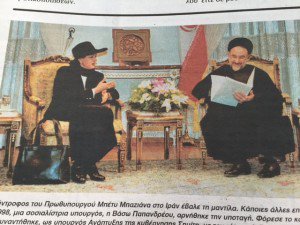Last weekend, an imposing Swedish delegation, which was led by�Prime Minister Stefan L�fven and included high-ranking representatives of�Swedish industry, visited Iran with�the double goal of�boosting economic ties with�the Islamic Republic and taking a stand for�human rights.
During the visit, which greased the machinery of�bilateral economic cooperation with�a number of�useful contacts, the two countries pledged to�cooperate in�areas such as�science and technology, education, research, transport and telecommunications. Needless to�say, it all had a price to�pay, as�Sweden ostensibly had to�dampen some of�its criticism of�Iran's human rights record and treatment of�women.
Remarkably, when the Swedish delegation landed on�Iranian soil, all the Swedish women put on�Muslim veils in�order to�comply with�the strict religious rules of�the theocracy. Swedish Trade Minister Ann Linde, who had previously earned a reputation as�a campaigner for�women's rights, was seen wearing Islamic garments during�her meetings with�Iranian officials, including President Hasan Rouhani and eight ministers, in�a photo gallery posted by�Iranian news agency IRNA.
View image on Twitter

Follow
 Bassam Al-Baghdady @Bassamius
Bassam Al-Baghdady @Bassamius�nnu mer skandaler som f�ljer h�r!!
Svenskminister kl� sig i T�lt

Juste... Dialog hj�lper till f�r�ndring!! Visst!#Svpol
6:40 PM - 11 Feb 2017
?At home, Linde's controversial attire sparked criticism for�the minister's failure to�take a stand for�the womankind.
"The [Islamic] veil symbolizes the oppression of�women in�Iran, and constitutes not only customary, but�legislated oppression of�women. It is very unfortunate that the Swedish minister chose to�appear in�a veil. It's almost a breakdown of�what is being described a 'feminist foreign policy,'" the Liberals' leader Jan Bj�rklund told the Swedish tabloid newspaper Aftonbladet.
Ann Linde defended herself by�stating that she was unwilling to�violate Iranian law. In Iran, it has been compulsory for�women to�wear headdress in�public since�the 1979 revolution, which previously triggered outrage during�sporting championships held in�the Islamic republic.
"Iranian women are fighting for�their right not to�wear the veil. Then feminist government representatives pop in, all veil-dressed, and instead of�making a stand tells them to�accept it," Amineh Kakabaveh of�the Swedish Left Party told Aftonbladet. "I am upset and angry. It all should have been so obvious for�a feminist government, but�instead it acts just like�any other," Amineh Kakabaveh argued.
View image on Twitter

Follow
 Henrik Brors @henrikbrors
Henrik Brors @henrikbrorsTeheran1998 Disa H�stad, DN: "Tuff dam i hatt utmanar mullorna" http://www.dn.se/arkiv/utland/teherantorsdag-tuff-dam-i-hatt-utmanar-mullorna/��
3:44 PM - 12 Feb 2017 � Stockholm, Sweden
Kakabaveh alluded to�German Chancellor Angela Merkel, who chose not wear a headscarf when she visited Saudi Arabia. Another historic example of�Western politicians unwilling to�comply with�Islamic dress code is Former Greek Development Minister Vasso Papandreou, who famously refused to�put on�headdress during�her visit to�Iran in�1998 and instead wore a stylish hat, which she deemed more becoming of�a Western woman.?Meanwhile, Swedish companies have been lining up�to gain access to�Iran's lucrative market after�the lifting of�international sanctions. In recent years, Swedish exports to�Iran have hovered around�2 billion SEK a year ($220mln), as�opposed to�6-7 billion SEK ($670-790mln) before�the sanctions. According to�an assessment by�Business Sweden, it has the potential to�increase to�12 billion SEK ($1.4bln) within�5-6 years.










